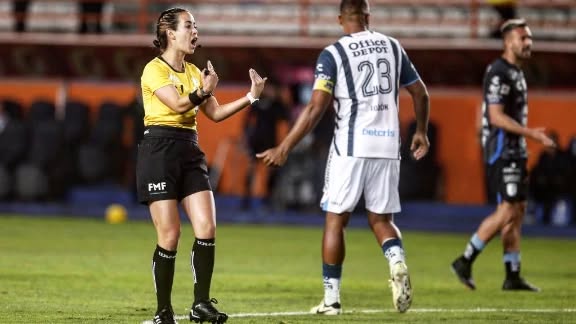Death Threats Against Mexican Referee Katia García Spark FIFA’s Unified Call to Protect Officials

When Mexican referee Katia Itzel García received threats on her life after a Leagues Cup match, what began as fan outrage spiraled into something more sinister—and in the fallout, global football found itself confronting its tolerance for terror.
A Whistle, a Result, and a Wave of Hatred
When García blew the final whistle in a dramatic 3-2 Leagues Cup match between FC Cincinnati and Monterrey, she expected some backlash. A controversial offside call, a no-penalty decision—referees live with the noise. But that night, something changed.
Within minutes, her phone filled with messages laced with bile and venom—the usual accusations, yes, but then threats. Serious ones. “You’re going to die,” one read. “Your family will pay,” another warned. The account bore Monterrey’s crest.
By morning, García—32, a seasoned professional and one of Mexico’s few women referees at the top level—had posted screenshots to her Instagram. “Mexico must stop normalizing violence,” she wrote. That act, part cry for help, part stand of defiance, transformed her private horror into a global flashpoint. “I’ve heard jeers for years,” she stated, “but this was different. This felt like someone waiting outside my door.”
Her courage in going public shattered the complacency that has long shadowed match officiating. She reminded the world: referees aren’t symbols. They’re people. And they bleed when attacked.
Mexico’s Familiar Silence, Finally Broken
García’s story struck a nerve in a country where violence is as constant as the weather—ninety-one murders per day. Ten women are killed every day, on average. In such a setting, threats often become background noise—until someone refuses to stay quiet.
“Everyone expects us to take it,” she said. “But how long before someone acts on it?”
Psychologists, labor unions, and journalists rushed to her side, recognizing the dangerous normalization of online threats—especially against women in visible, traditionally male roles. Referees in Mexico, like police officers and politicians, have become lightning rods for anger, mainly since the pandemic migrated fan rage from stadium seats to screens.
And for women like García, the abuse often carries an additional layer of misogyny—rape threats, slurs, targeted harassment of families.
Luis García, president of Mexico’s Referees Union, called it a “wake-up call we’ve long delayed.” Others weren’t as measured. A veteran Liga MX official stated that “someone’s going to get hurt one day, and everyone will act surprised.”
This time, García’s refusal to stay silent forced the conversation into national headlines. If referees can’t feel safe, what does that say about everyone else?
A Sport Forced to Choose Sides
The reaction from football’s power structure was fast—and unusually united.
The Mexican Football Federation pledged legal support and personal security within hours. Monterrey, the very club whose fans were implicated, issued a rare statement denouncing “unacceptable behavior.” Then came the international firestorm.
FIFA President Gianni Infantino posted on social media: “Without referees, there is no football. We must protect them.” CONCACAF echoed him, promising to explore protective protocols and pushing member clubs to prioritize official safety.
Even rival managers, often among referees’ loudest critics, stepped in to defend García. One Liga MX coach praised her “professionalism under impossible pressure.” Another thanked her for “showing us what courage looks like.”
It was a rare moment of consensus in a sport often splintered by ego and money. But the question now is what comes after the press releases.
Can the outrage build something lasting?

EFE
Toward Safety, Respect—and Real Consequences
Behind the statements lies a quieter campaign: the hunt for those who sent the threats. Cybercrime units in both Mexico and the U.S. are now tracking the IP addresses linked to the messages. Officials want arrests, not apologies.
“Legal consequences are the only language some people understand,” one investigator said. “We’re not just talking about bad behavior—we’re talking about crimes.”
García, meanwhile, is preparing for her next match. Friends say she’s calm, but changed. She now trains her voice as much as her fitness—learning how to de-escalate on-field tension before it spills into rage.
“She knows every step onto the pitch is symbolic now,” said her longtime mentor. “She’s not just a referee. She’s the face of a bigger fight.”
Across youth leagues, similar stories surface. Officials quitting. Games are canceled because referees walk away. One referee in Guadalajara stated that after a death threat from a parent at a school match, he never returned. “No game is worth that,” he said.
The ripple effects are real. And so is the message: If the abuse continues, the sport will lose the people who keep it fair.
Katia Itzel García’s story is not just about one woman. It’s about a line that should never have been crossed—and about whether football has the will to draw it back again.
Will leagues implement cooling-off periods before fans can message referees? Will clubs be fined when fans cross the line? Will there be psychological support, not just for the abused, but for the enforcers of the game?
Also Read: South American Stars Turn Club World Cup into European Runway
For now, García remains in the center circle, whistle in hand. Every time she lifts it to her lips, it is a reminder: there is courage in consistency, power in refusing to back down, and dignity in demanding the right to do your job without fear. The world listened this time. The question is whether it will act.





